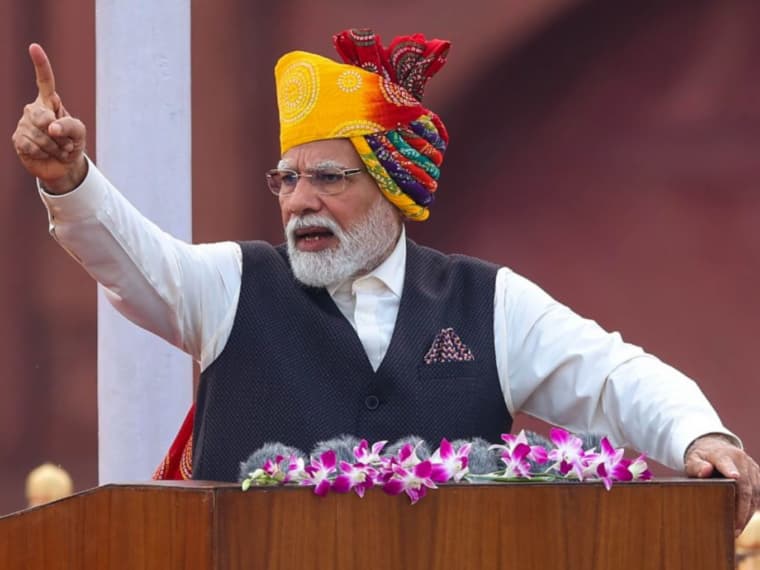
In his Independence Day speech, PM Narendra Modi said he wants India to lead in the production of online games
Modi called on the youth of the country to take Indian online games global
PM Modi also highlighted that the government’s decision to open up the space sector for private players has led to the emergence of a number of spacetech startups
Prime Minister Narendra Modi has called on the youth of the country to make India a leading nation in the gaming industry by taking online games from the country to the world.
In his Independence Day speech from the ramparts of the Red Fort, Modi said, “India has seen a boom in the development of its gaming market. However, I want the country’s youth to lead the gaming industry not just in playing but also in producing games. Indian games must reach the world.”
With increasing penetration of the internet and improving access to smartphones, the number of gamers is on the rise in the country. The country is currently home to about 500 Mn gamers.
This has also spawned a number of homegrown gaming startups over the last few years, including unicorns like Dream11, Games24X7 and Mobile Premier League (MPL). As a result, the annual revenue of the overall Indian gaming industry is expected to almost double to $6 Bn by 2028 from $3.1 Bn in 2023, according to a report by Winzo.
Commenting on the prime minister’s comment, esports company Skyesports’ CEO Shiva Nandy said, “Rapid smartphone penetration and affordable internet are driving a massive influx of gaming consumers in India. However, the market has been largely dominated by foreign titles due to a lack of homegrown games. The Indian government’s recent push for local game development is a crucial step in bridging this gap.”
It is pertinent to note that the growth within the country’s gaming sector hasn’t been even. While smaller games often prop up in the market, there is a dearth of AAA games. AAA games have higher budgets and are produced and distributed by large gaming publishers. These games are primarily used in gaming competitions.
However, industry veterans foresee a shift in the production of such games. Last year, Nazara Technologies CEO and joint MD Nitish Mittersain predicted that many Indian gaming studios are on their way to develop and become more visible in global gaming charts.
Last year, Nazara, a prominent name in the Indian gaming sector, partnered four Indian game studios to publish five casual and mid-core games in India. Last week, the listed gaming giant also acquired UK-based IP gaming studio Fusebox Games.
MPL’s mobile game development arm Mayhem Studios and Karan Shroff’s LightFury Games are among the other major players in the space.
PM Modi Highlights Growth Of Spacetech Startups
In his address, PM Modi also reiterated the government’s focus on India’s nascent spacetech ecosystem.
“Spacetech sector is the future for India and we are focusing on it. The shackles that were chaining India’s progress in the space sector have been lifted as we have introduced many reforms. This has led to a plethora of startups entering India’s space segment, making it more vibrant,” he said during his 11th Independence Day speech.
The prime minister also expressed pride on the recent private rocket and satellite launches.
It is pertinent to note that spacetech startup Agnikul Cosmos recently completed the first flight or Mission 01 of its homegrown rocket Agnibaan SOrTeD, while GalaxEye is looking to launch its satellite soon.
Modi’s remarks came a few weeks after finance minister Nirmala Sitharaman unveiled an INR 1,000 Cr venture capital (VC) fund for the space sector in her Union Budget speech. With the fund, the Centre is looking to expand the country’s space economy 5X in the next 10 years.
Besides the launch of the fund, the government has taken several steps in the recent past for India’s space industry. These include the establishment of the Indian National Space Promotion and Authorisation Centre (IN-SPACe) as the nodal agency to support startups and allowing up to 100% foreign direct investment (FDI) via the automatic route for certain sub-segments in the space sector.




 Fintech
Fintech Travel Tech
Travel Tech Electric Vehicle
Electric Vehicle Health Tech
Health Tech Edtech
Edtech IT
IT Logistics
Logistics Retail
Retail Ecommerce
Ecommerce Startup Ecosystem
Startup Ecosystem Enterprise Tech
Enterprise Tech Clean Tech
Clean Tech Consumer Internet
Consumer Internet Agritech
Agritech




























